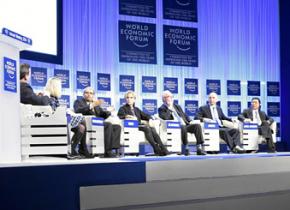Partying while the earth burns
argues that the meeting of world leaders at the World Economic Forum in Davos, Switzerland, will do nothing to stop the ecological crisis.
ONCE A year, the world's political and business leaders flock to a small town in the Alps, where they drink champagne, chow down on fondue and chocolate-covered strawberries, hit the ski slopes, bathe in hot tubs, and exchange business cards as they congratulate themselves on the fine job they're doing running things.
Oh, and while in Davos, Switzerland, they also participate in the World Economic Forum (WEF), which took place last week, ending on Saturday.
Mind you, there are hundreds of sessions there to attend, with titles like "Doing Business the Right Way" and "The Civic Role of Business." But these are, as Stephen Gandel, a senior editor at Fortune, puts it, "boring."
And yet, as these core members of the global 1 Percent live it up in Davos, there is a crisis of biblical proportions brewing--a planetary emergency on the horizon, which Steve Horn and I address in the Transnational Institute's annual State of Power report, released this week. The ticking climate-bomb is not going away, though the global elite at WEF is doing its best to whitewash and ignore it.

Some call it "climate change," others "climate chaos." Those who have seen an early taste of what is to come might refer to it as Superstorm Sandy, Typhoon Yolanda or simply as abaar--drought, in the national language of Somalia, where an El Niña event three summers ago led to widespread famine.
Ninety-eight out of 100 climate scientists will tell you that the burning of fossil fuels has overburdened our atmosphere with heat trapping greenhouse gases. There are also increasing warnings from the scientific community that we will reach a tipping point when solar panels just won't cut it, and when the human race's ability--its chance--to grow food and maintain a habitable Earth will have eroded.
MOST SCIENTISTS, however, remain too modest or confined by the parameters of their field to venture into the realm of "social science" by indicating who is actually responsible.
Some have begun to label our current geological epoch the "Athropocene," identifying humankind's awesome power to alter the planet's atmospheric configuration by igniting liquified fossils as a new stage in the Earth's evolution.
Together with TNI, we've gone a step further, identifying the specific anthropods who are fueling climate change: the energy corporations, financial and governmental actors licking the coagulated cheese from their teeth up in the Alps. These three players--big energy, big finance and complicit governments--have formed what Horn and I, appropriating from linguist and political philosopher Noam Chomsky, term a "Fateful Triangle."
The coordinates are simple: Energy corporations extract and transport fossil fuels to market. Wall Street finances the operation. Governments, whose political pockets are lined with fossil-fuel dollars, turn the other way.
Overtures to sustainability ensue from all corners of the Fateful Triangle, each, to varying degrees, recognizing the wickedness of their ways--or at least the potential for public backlash.
The Pentagon, the largest institutional consumer of fossil fuels on Earth, has identified climate change as a threat to national security. Chevron shares that concern. Bank of America's Chairman Charles Holliday has hopped in to co-chair the UN's High-Level Group on Sustainability for All. Never mind his bank's investments in Appalachian and South African coal projects.
But the Fateful Triangle has nothing but bunk solutions, like carbon trading and biofuel, to offer. These so-called remedies are, by design, aimed at maintaining business as usual.
The reality is that competing states whose GDPs are tied to fossil-fueled growth will not agree to reduce emissions, no matter how many UN conferences are held on the matter. Profiteers won't abandon their stake in tar sands and hydro-fracking as long as there's money to made in these extreme fuels.
The sadistic drive for profit that possesses our global elites is wonderfully illustrated in the summery of a WEF seminar titled "The Melting Arctic."
Supposing the denizens of Davos weren't too hung over or bloated from the previous night's feasting, they could come explore the "opportunities of Arctic development" that global warming has to offer. All that carbon and methane we've burned has, after all, given us the chance to extract more carbon and methane.
Humanity does have a chance at survival: it just lies at much lower altitudes in the social hierarchy than the crowd now patting themselves on the back in Switzerland. We have enough wind and sun and tidal power at our disposal, if harnessed sustainably, to avert the worst impending impacts of climate change.
Grassroots confrontations with state and corporate power, as witnessed in 2013 at Istanbul's Gezi Park and across cities of Brazil--and preceded in 2011 and 2012 by social movements like Occupy Wall Street and Idle No More--prefigure the larger struggles to come on a global scale as humans fight for clean air and the right to a future free of extreme weather.
But before we can transition to renewable power, those on the bottom of society's social rungs may have to catch some of that festive spirit, crash the party happening in Davos, and wrest power from those on the mountaintop.
First published at Occupy.com.


